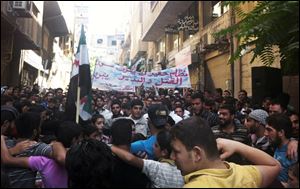
Red Cross says Syria in civil war
Activists report capital under siege by troops
7/16/2012
Syrians chant during a demonstration in Damascus in this picture taken by an anonymous photographer. A partial translation of Arabic on the banner is "a horrible regime, killing and destruction."
DAMASCUS -- As some of the heaviest fighting in Syria's capital raged on Sunday, the 16-month bloodbath crossed an important threshold when the International Red Cross formally declared the conflict a civil war, a status with implications for potential war-crimes prosecutions.
Activists said Syrian forces had closed the road to the airport and were trying to surround fighters in southern neighborhoods of Damascus to crush unrest inside the capital.
"There are hundreds of fighters in Damascus right now, we'll see what happens," said an activist in the capital reached by Skype, who asked not to be named. "If the regime is able to crush the fighters in Tadamon the clashes should stop, but if not they may spread further."
The Red Cross declared Syria in a state of civil war as United Nations observers gathered new details on what happened in a village where dozens were reported killed on Thursday.
After a second visit to Tremseh on Sunday, the observers said Syrian troops went door to door in the small farming community, checking residents' IDs and then killing some and taking others away.
WHAT IT MEANS
The Red Cross said it now considers the Syrian conflict a civil war, meaning international humanitarian law applies throughout the country.
Also known as the rules of war, humanitarian law grants all parties in a conflict the right to use appropriate force to achieve their aims.
The group's assessment is an important reference for determining how much and what type of force can be used, and it can form the basis for war-crimes prosecutions, especially if civilians are attacked.
According to the U.N. observers, the attack appeared to target army defectors and activists.
"Pools of blood and brain matter were observed in a number of homes," a U.N. statement said.
Syria denied U.N. claims that government forces had used heavy weapons such as tanks, artillery, and helicopters during Thursday's attack.
Syrian Foreign Ministry spokesman Jihad Makdissi said the violence was not a massacre -- as activists and many foreign leaders have alleged -- but a military operation targeting armed fighters who had taken control of the village.
"What happened wasn't an attack on civilians," Mr. Makdissi said in Damascus.
He said 37 gunmen and two civilians were killed -- a far lower death toll than the one put forward by anti-regime activists, some of whom estimated the dead at more than 100.
"What has been said about the use of heavy weapons is baseless," Mr. Makdissi added.
The United Nations has implicated President Bashar Assad's forces in the assault.
The head of the U.N. observer mission said Friday that monitors stationed near Tremseh saw the army using heavy weaponry and attack helicopters.
The fighting was some of the latest in the uprising against Assad, which activists say has killed more than 17,000 people.
Violence continued Sunday, with escalating clashes reported around Damascus.
The International Committee of the Red Cross said it now considers the Syrian conflict a civil war, meaning international humanitarian law applies throughout the country.
Also known as the rules of war, humanitarian law grants all parties in a conflict the right to use appropriate force to achieve their aims.
The Geneva group's assessment is an important reference for determining how much and what type of force can be used, and it can form the basis for war-crimes prosecutions, especially if civilians are attacked or detained enemies are abused or killed.
"We are now talking about a noninternational armed conflict in the country," Red Cross spokesman Hicham Hassan said.
War-crimes prosecutions would have been possible even without the Red Cross statement. But Sunday's pronouncement adds weight to any prosecution argument that Syria is in a state of war -- a prerequisite for a war-crimes case.
Previously, the Red Cross committee had restricted its assessment of the scope of the conflict to the hot spots of Idlib, Homs, and Hama. But Mr. Hassan said the organization concluded that the violence was widening.
"Hostilities have spread to other areas of the country," he said. "International humanitarian law applies to all areas where hostilities are taking place."
Although the armed uprising in Syria began more than a year ago, the committee had hesitated to call it a civil war -- although others, including United Nations officials, have done so.
That is because the rules of war override and to some extent suspend the laws that apply in peacetime, including the universal right to life, right to free speech, and right to peaceful assembly.
Iranian Foreign Minister Ali Akbar Salehi said Tehran is ready to invite Syrian opposition groups and government envoys for talks, the semiofficial ISNA news agency reported.
Members of the opposition quickly rejected the offer.
The statement by Mr. Salehi appeared to suggest a possible shift in the Iranian leadership's approach. Iran consistently has supported Assad's efforts to suppress the uprising.
"The Islamic Republic of Iran is ready to sit down with the Syrian opposition and invite them to Iran," Mr. Salehi was quoted as saying by the Iranian Students' News Agency. "We are ready to facilitate and provide the conditions for talks between the opposition and the government."
Samir Nashir, an executive board member of the exile Syrian National Council, turned down the offer.
"We will not participate in any meetings or talks with the regime as long as Assad is in power. Assad does not need talks; he needs to go to the International Criminal Court for the massacres he's committed," he said.
"We will not speak to any mediators, whether they are Iranian, Syrian, or Russian."